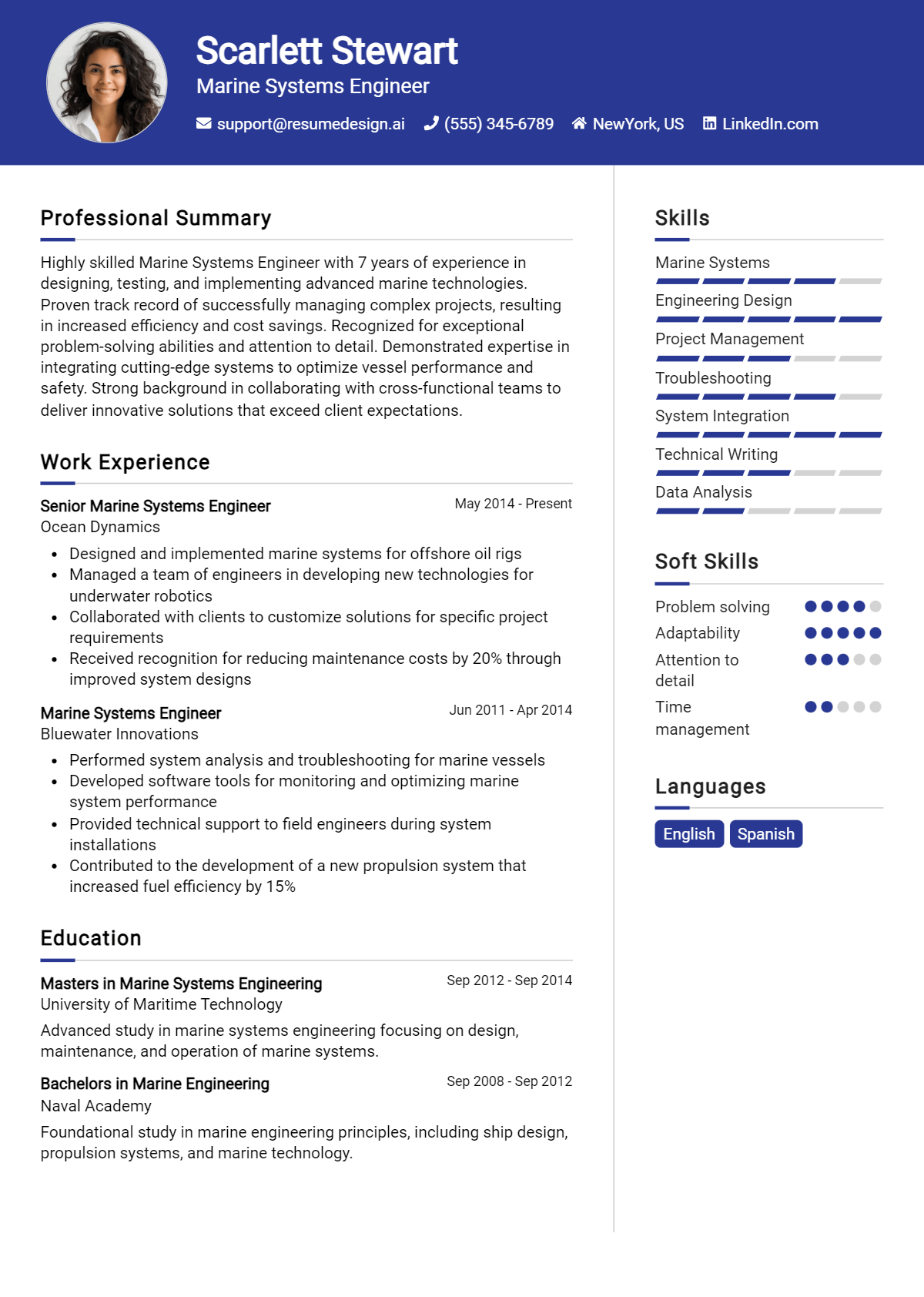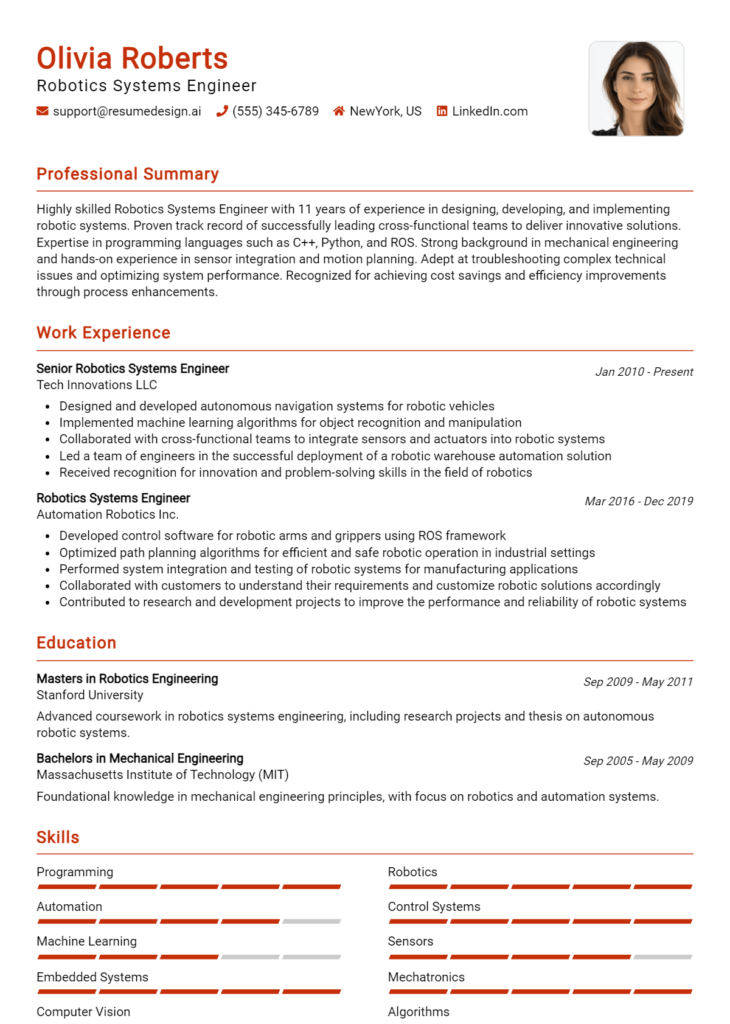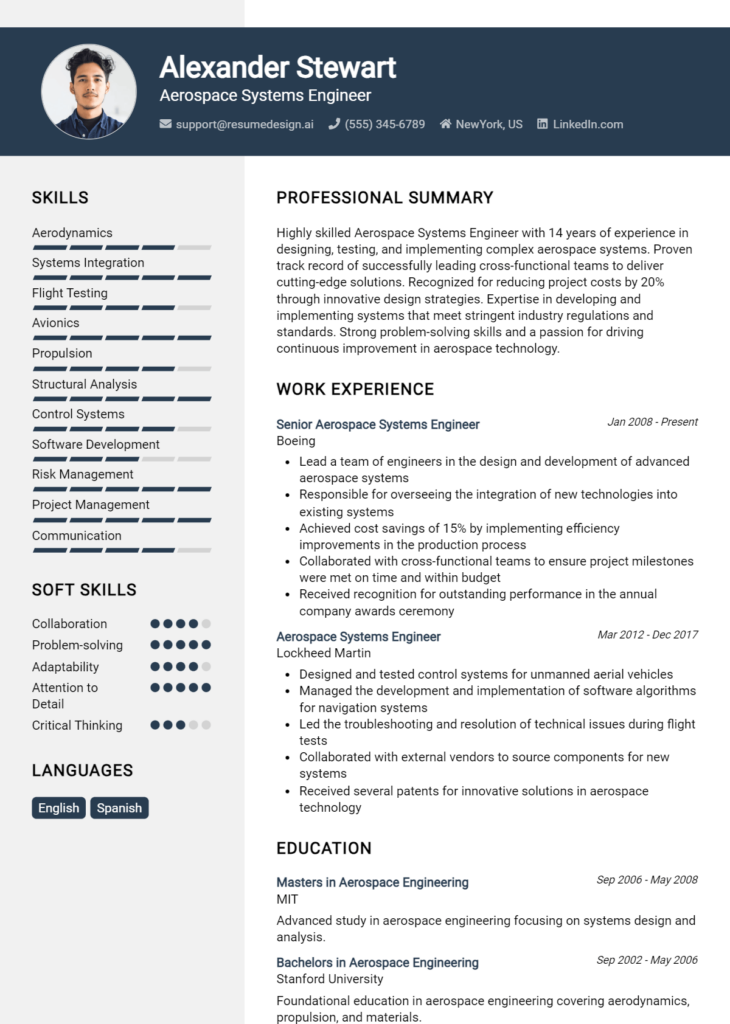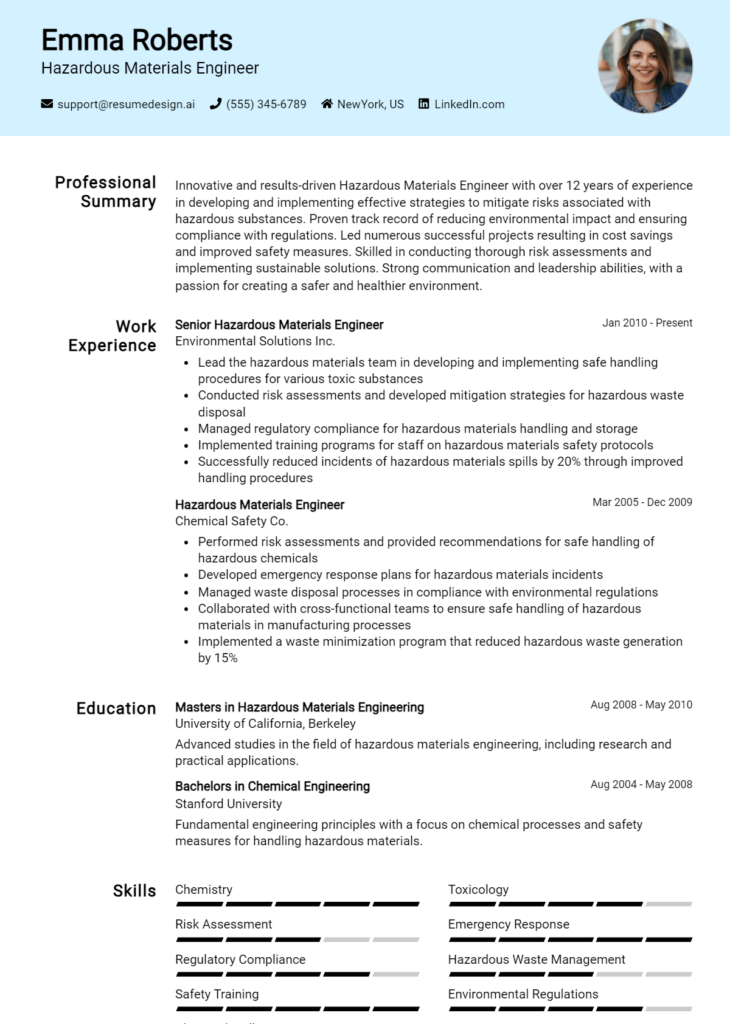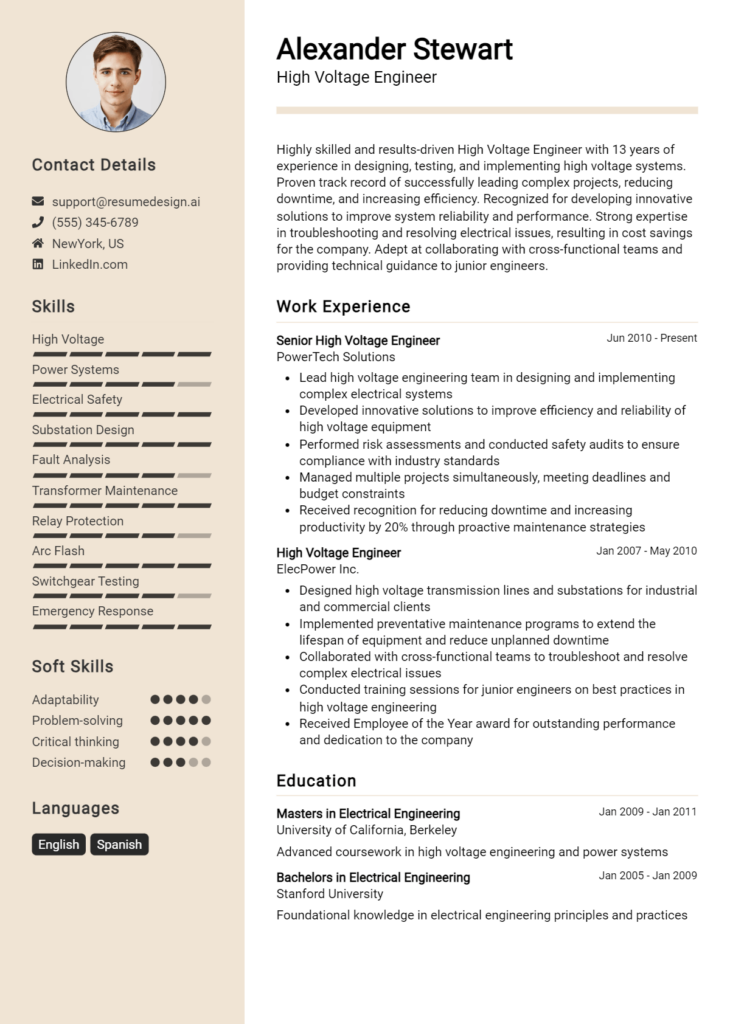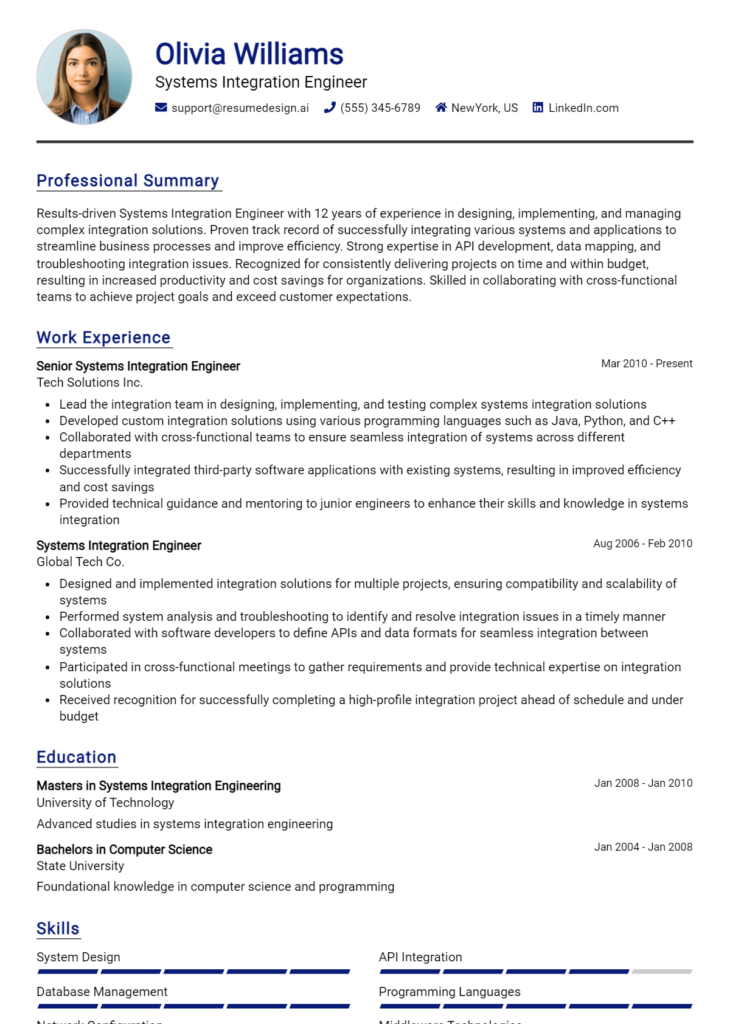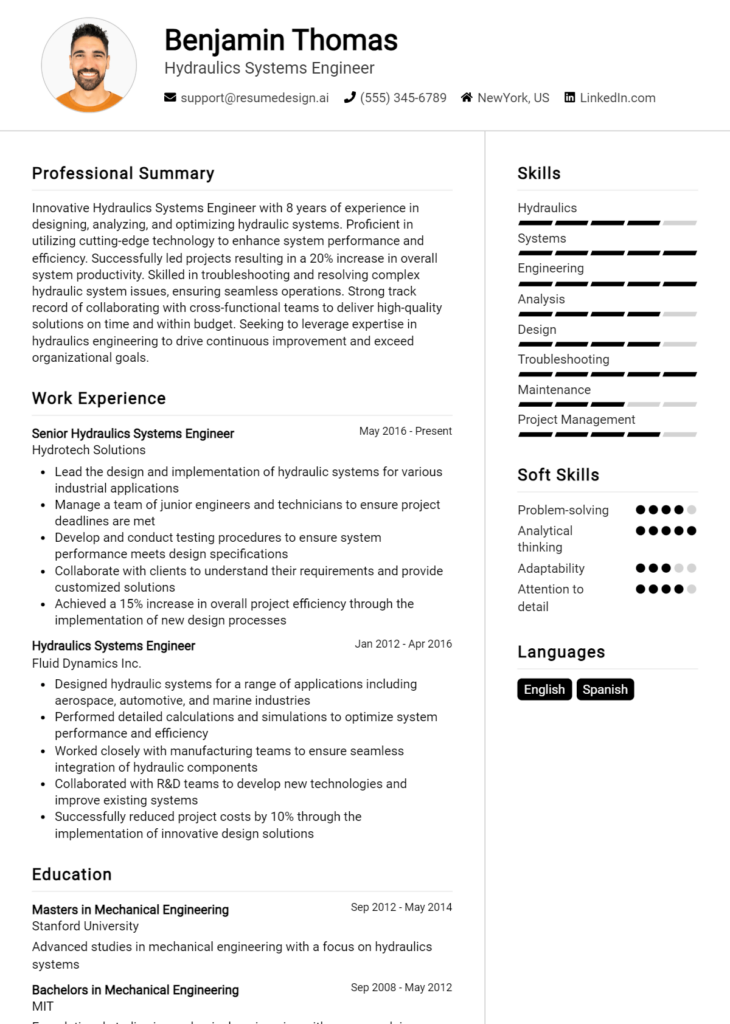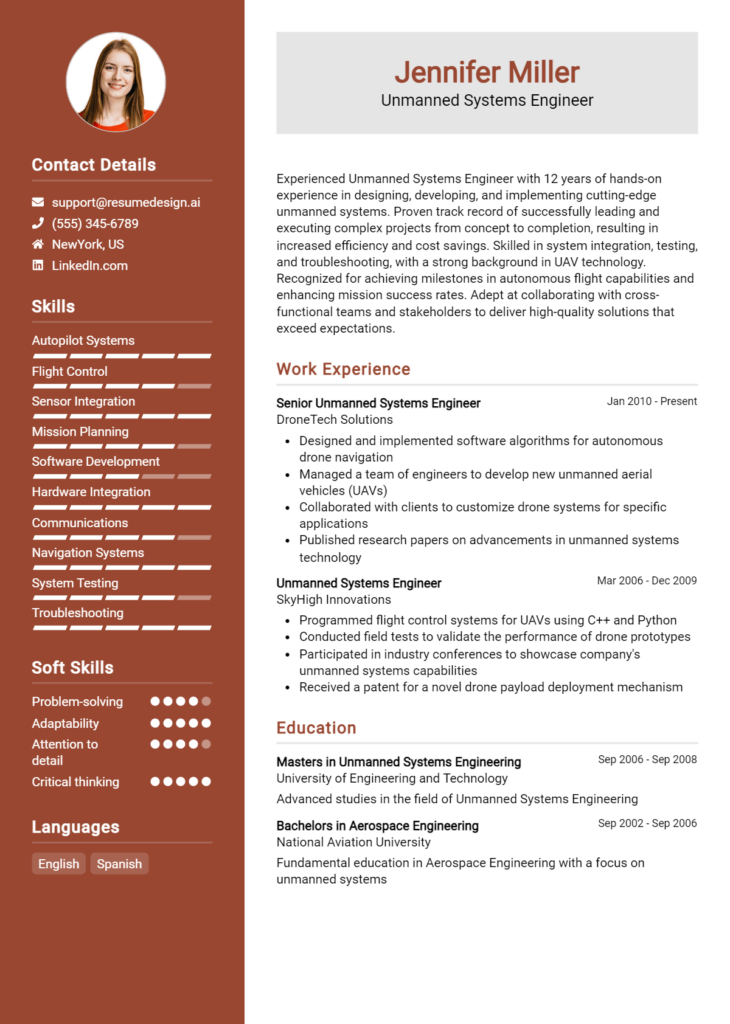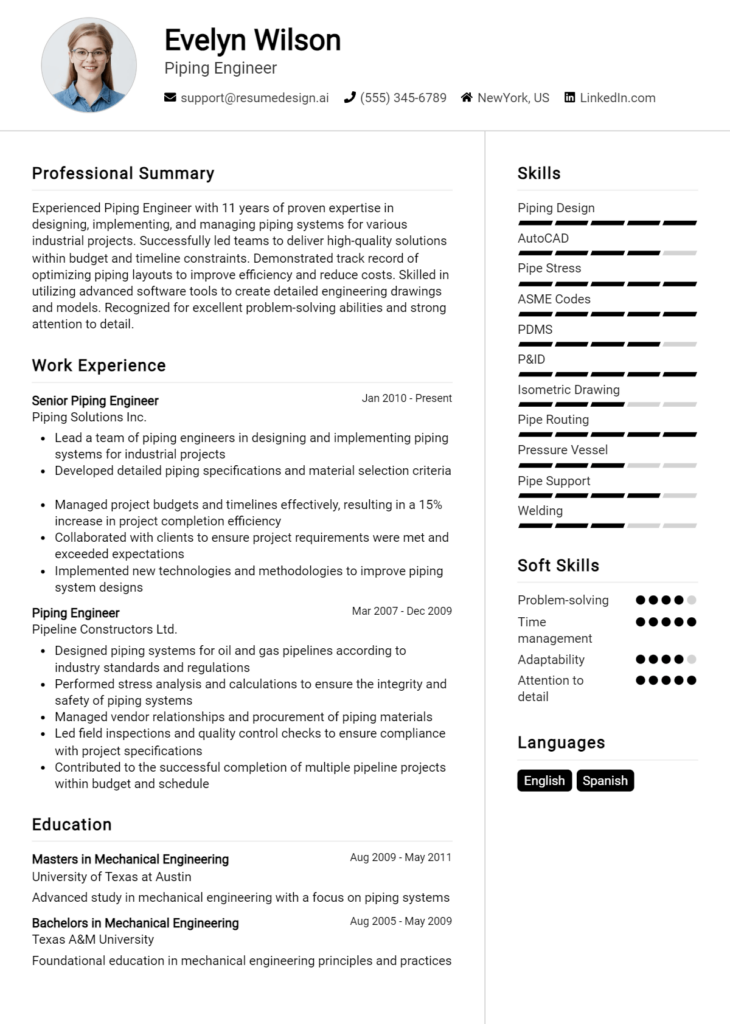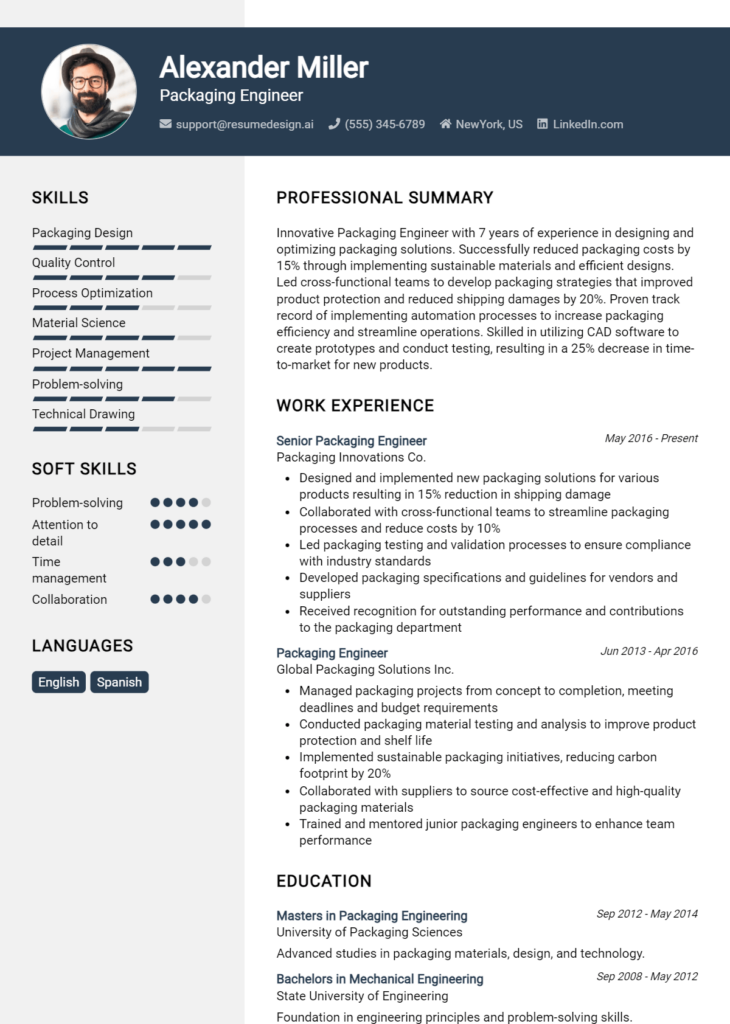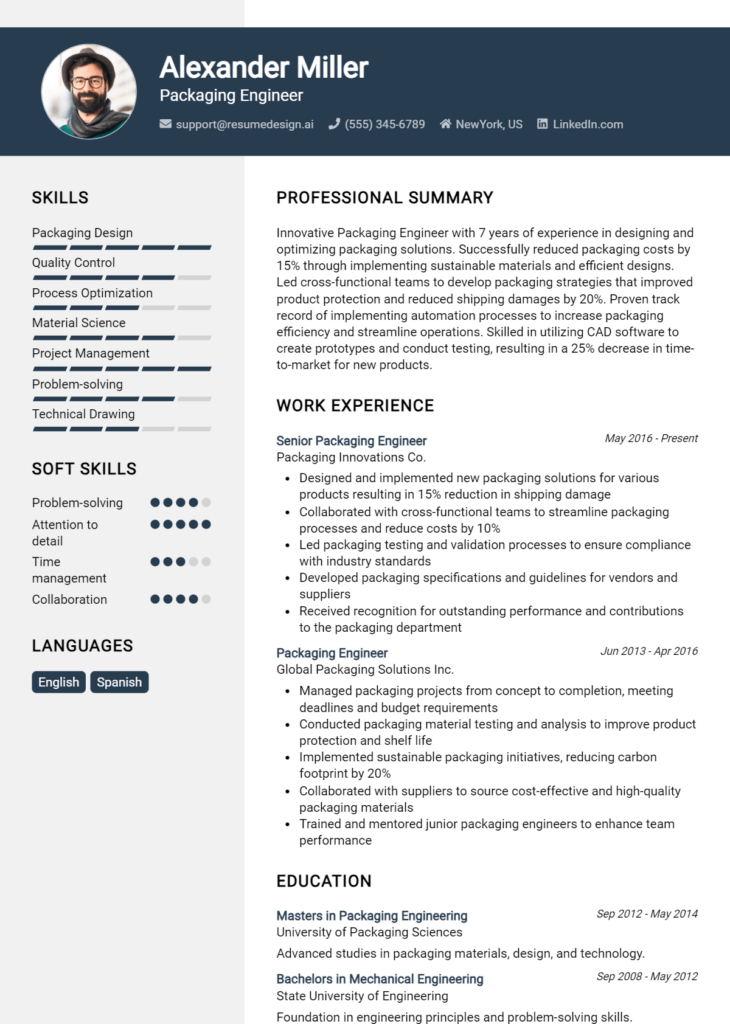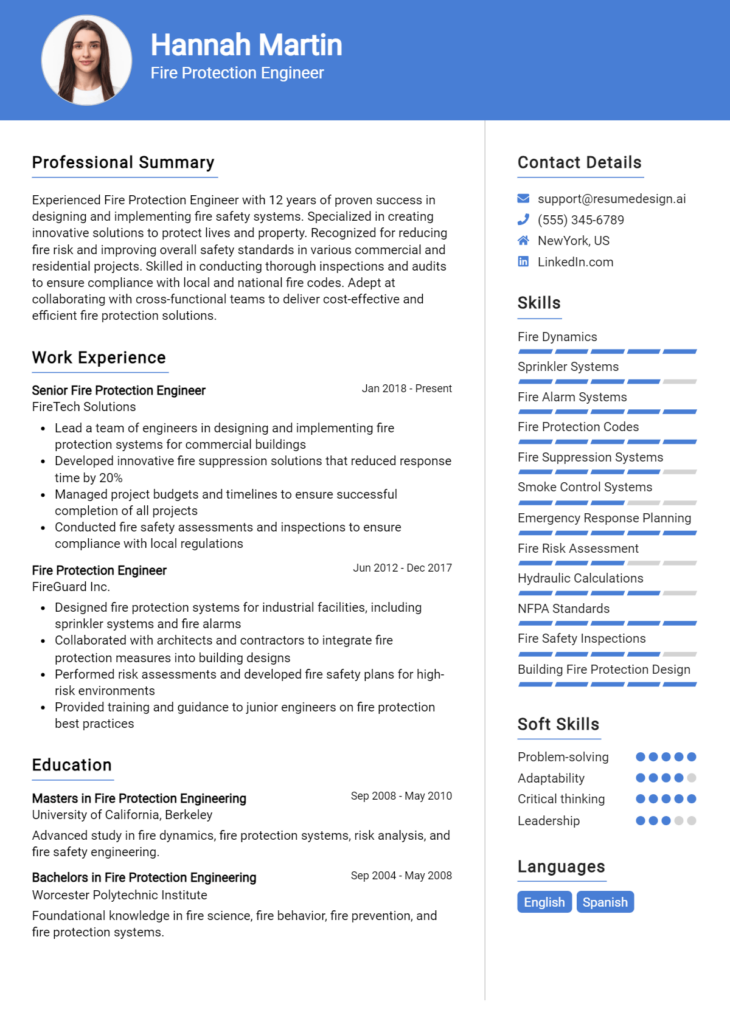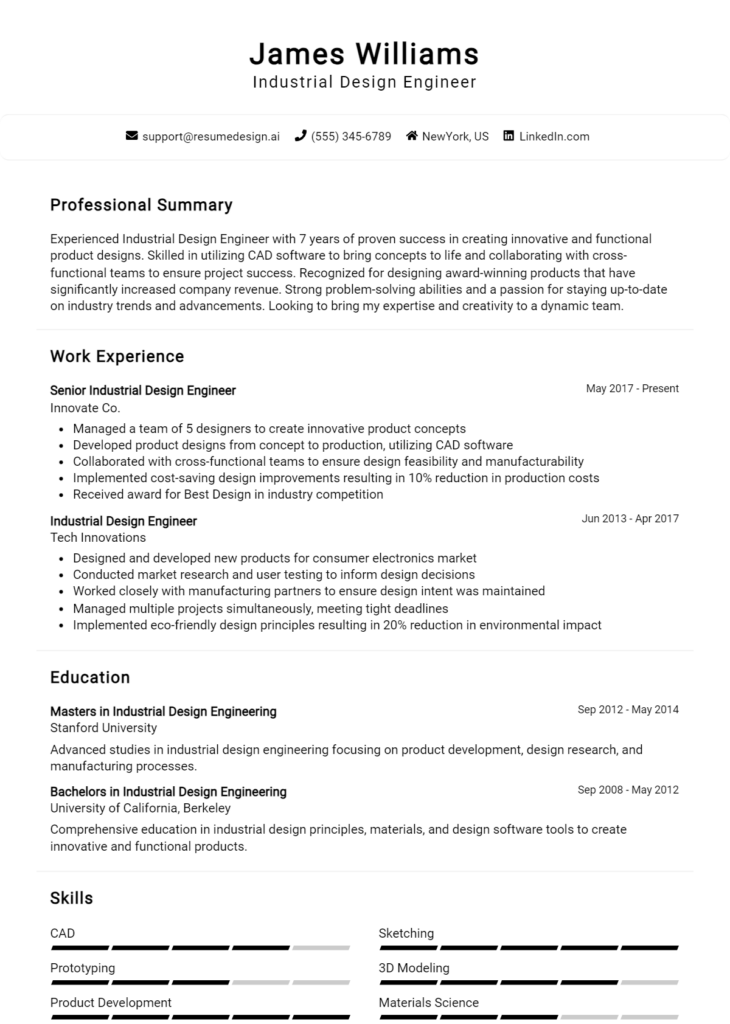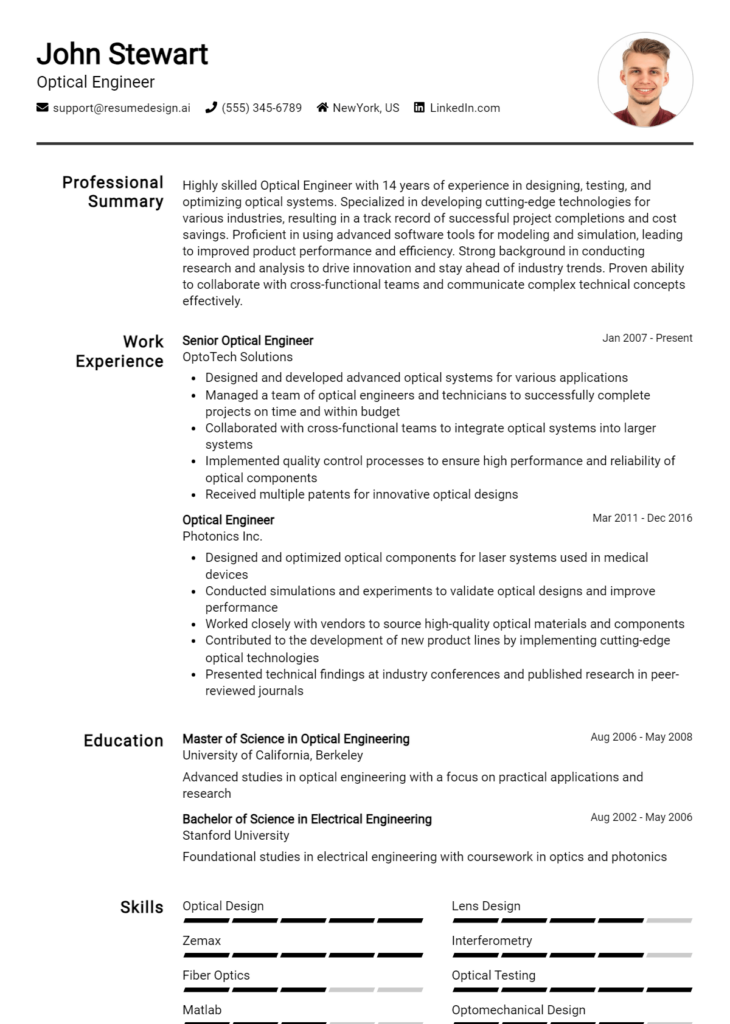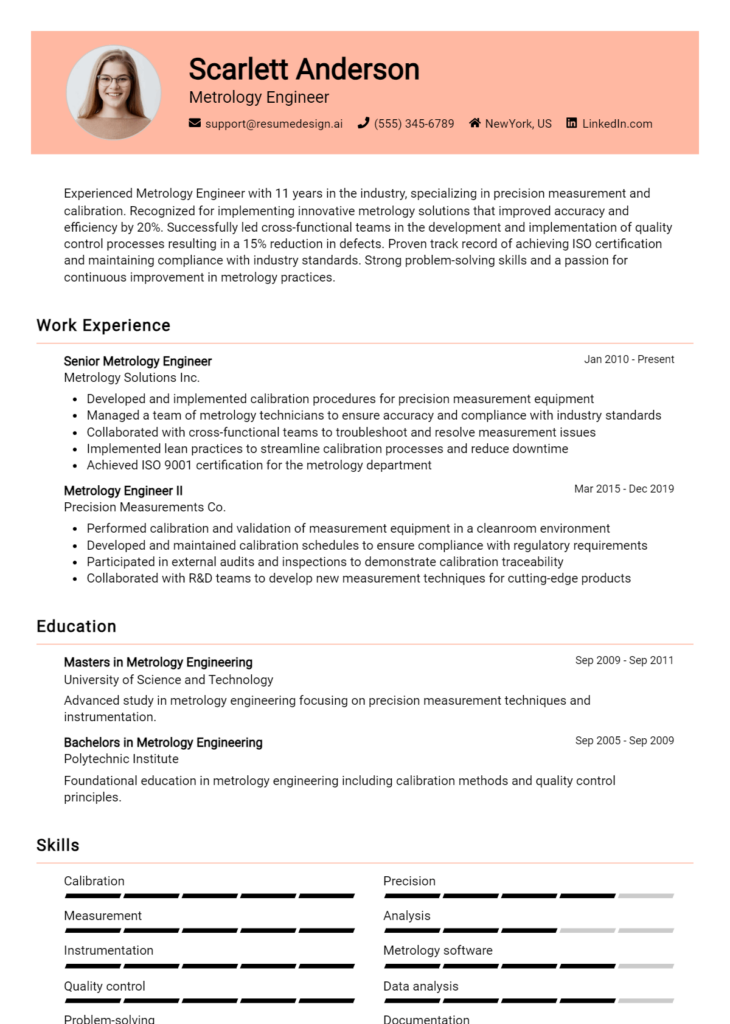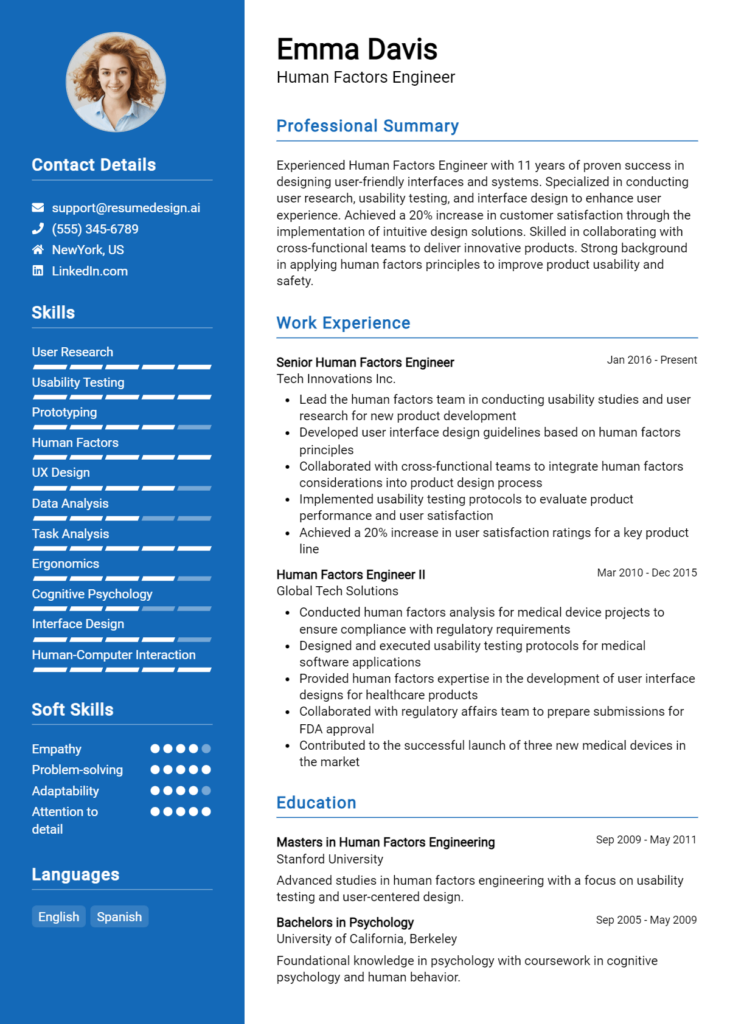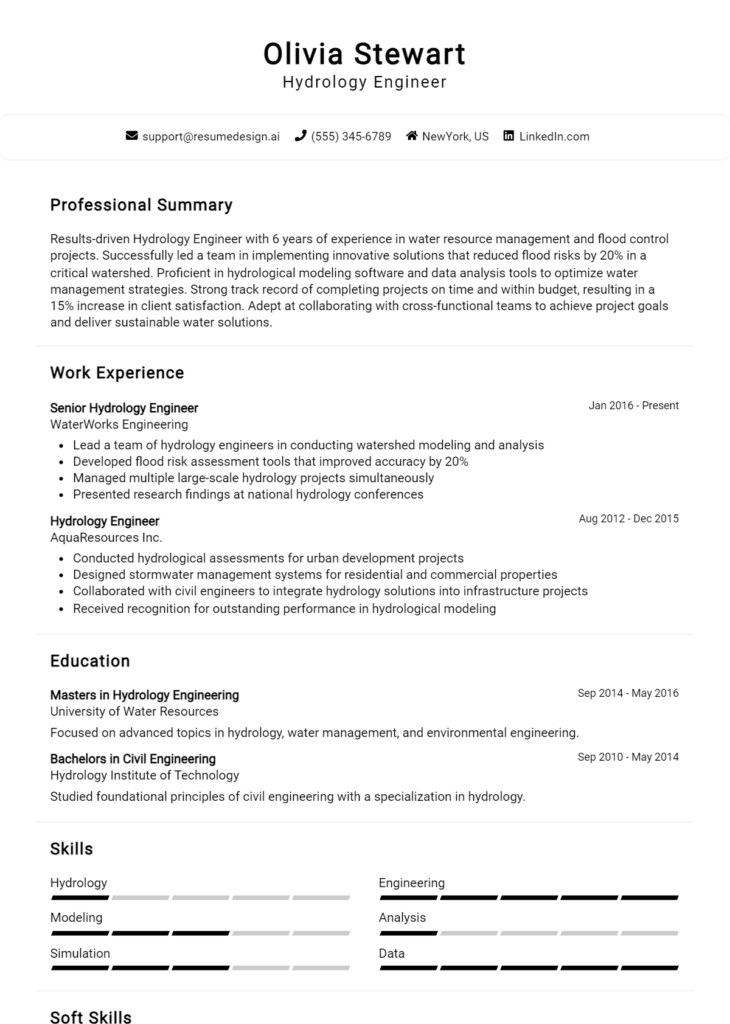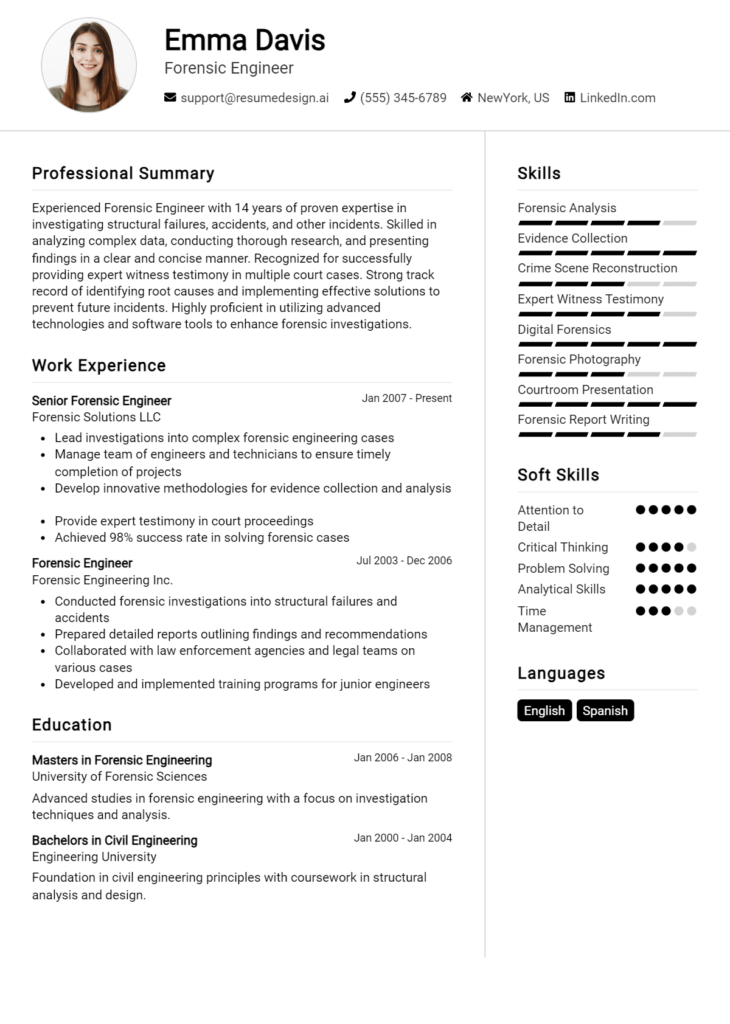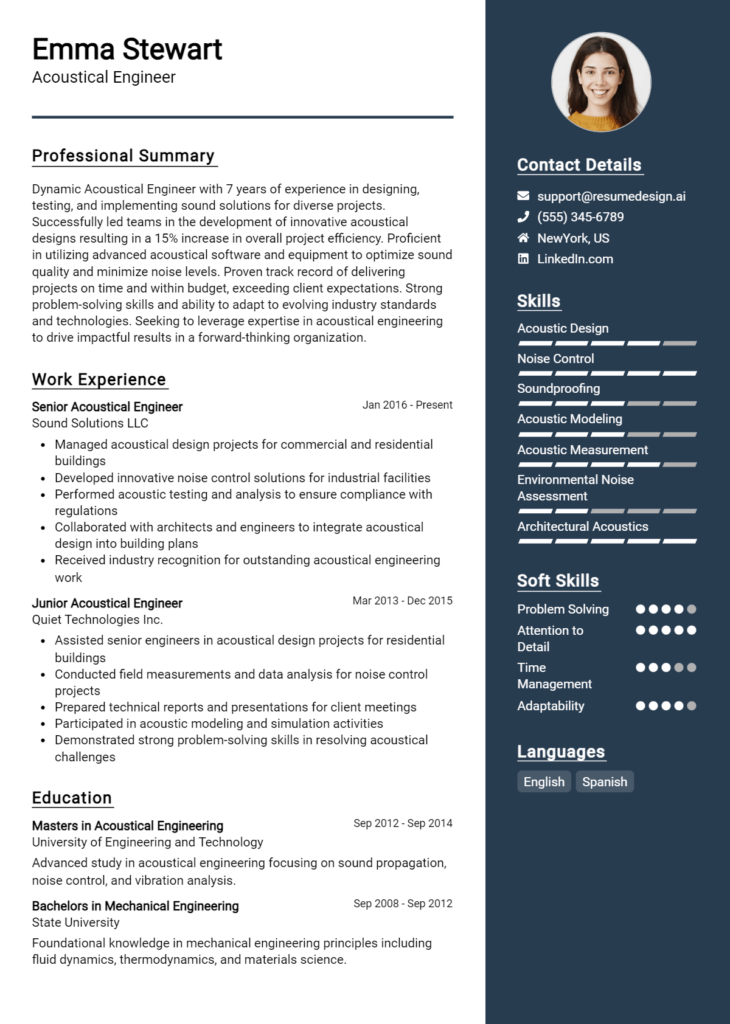Marine Systems Engineer Core Responsibilities
A Marine Systems Engineer plays a crucial role in the design, development, and maintenance of marine systems, ensuring they operate efficiently and safely. This professional bridges various departments, collaborating with naval architects, electrical engineers, and project managers. Key skills include technical expertise in marine technology, operational acumen, and strong problem-solving capabilities. These skills are vital for achieving organizational goals, and a well-structured resume can effectively highlight these qualifications, showcasing the engineer's versatility and impact.
Common Responsibilities Listed on Marine Systems Engineer Resume
- Design and analyze marine systems and equipment.
- Conduct feasibility studies and performance evaluations.
- Collaborate with cross-functional teams to integrate systems.
- Oversee installation and commissioning of marine systems.
- Develop maintenance schedules and procedures.
- Ensure compliance with safety and environmental regulations.
- Provide technical support and troubleshooting expertise.
- Prepare detailed reports and documentation for stakeholders.
- Manage project timelines and budgets.
- Research and implement new technologies in marine engineering.
- Conduct risk assessments and develop mitigation strategies.
- Train and supervise junior engineers and technicians.
High-Level Resume Tips for Marine Systems Engineer Professionals
In the competitive field of marine systems engineering, a well-crafted resume serves as your personal marketing tool and often forms the first impression you leave on potential employers. This critical document must effectively showcase your skills, achievements, and relevant experience, establishing your credentials and setting you apart from the competition. A resume that reflects your technical expertise and accomplishments not only captures attention but also communicates your potential value to an organization. In this guide, we will provide practical and actionable resume tips specifically tailored for Marine Systems Engineer professionals, ensuring you present the best version of yourself to prospective employers.
Top Resume Tips for Marine Systems Engineer Professionals
- Tailor your resume to the specific job description by incorporating relevant keywords and phrases.
- Highlight your technical skills, including software and systems you are proficient in, such as CAD software or simulation tools.
- Showcase relevant experience by detailing your previous roles and responsibilities in marine systems engineering projects.
- Quantify your achievements with metrics, such as improvements in efficiency, cost savings, or project completion times.
- Include certifications and licenses that are pertinent to marine systems engineering, such as those from recognized bodies.
- Utilize a clean and professional format that enhances readability and allows key information to stand out.
- Incorporate a summary statement at the top that encapsulates your expertise and career goals.
- Use action verbs to convey your contributions effectively and demonstrate your proactive approach.
- List any relevant projects or research you have conducted, particularly those that showcase innovation in marine systems.
- Keep your resume concise, ideally one to two pages, focusing on the most relevant information for the position you are applying for.
By implementing these tips, you can significantly enhance your resume’s effectiveness, increasing your chances of securing a job in the marine systems engineering field. A well-structured and focused resume not only highlights your qualifications but also presents you as a strong candidate ready to tackle the challenges of the industry.
Why Resume Headlines & Titles are Important for Marine Systems Engineer
In the competitive field of marine systems engineering, a well-crafted resume headline or title plays a crucial role in attracting the attention of hiring managers. It serves as a first impression, encapsulating a candidate's key qualifications and unique selling points in a concise and impactful phrase. A strong headline not only grabs attention but also sets the tone for the rest of the resume, making it essential for candidates to ensure that their titles are relevant to the specific job they are applying for. By summarizing their expertise and experience in a few words, candidates can effectively communicate their value and increase their chances of being noticed in a crowded job market.
Best Practices for Crafting Resume Headlines for Marine Systems Engineer
- Keep it concise—aim for one to two lines maximum.
- Make it role-specific by including the title of the position you are applying for.
- Incorporate relevant keywords that align with the job description.
- Highlight your most significant qualification or achievement.
- Use action-oriented language to convey confidence and proactivity.
- Avoid jargon or overly technical terms that may not resonate with hiring managers.
- Tailor your headline for each application to ensure relevance.
- Make it compelling to encourage further reading of your resume.
Example Resume Headlines for Marine Systems Engineer
Strong Resume Headlines
Innovative Marine Systems Engineer with 10+ Years of Experience in Underwater Robotics Development
Results-Driven Marine Engineer Specializing in Sustainable Vessel Design and Energy Efficiency
Certified Marine Systems Engineer with Proven Track Record in Project Management and System Optimization
Weak Resume Headlines
Looking for a Job in Engineering
Marine Engineer with Some Experience
Strong headlines are effective because they convey specific skills, experiences, and accomplishments that directly relate to the job at hand, making them memorable and compelling for hiring managers. They highlight what sets the candidate apart from others. In contrast, weak headlines tend to be vague or generic, lacking the necessary detail to capture interest or convey the candidate's unique qualifications, thus failing to make a strong impact in a competitive job market.
Writing an Exceptional Marine Systems Engineer Resume Summary
A resume summary is a critical component for a Marine Systems Engineer, serving as a first impression that can significantly influence hiring managers. An exceptional summary quickly captures attention by highlighting key skills, relevant experience, and notable accomplishments in the marine engineering field. It should be concise yet impactful, tailored specifically to the job being applied for, ensuring that it resonates with the employer's needs and expectations. A well-crafted resume summary not only sets the tone for the rest of the resume but also positions the candidate as a strong contender for the role.
Best Practices for Writing a Marine Systems Engineer Resume Summary
- Quantify achievements: Use numbers to illustrate your successes, such as cost savings or project timelines.
- Focus on relevant skills: Highlight technical competencies and soft skills that align with the job description.
- Tailor your summary: Customize each summary to reflect the specific requirements and keywords from the job posting.
- Be concise: Aim for 2-4 sentences that deliver maximum impact without unnecessary details.
- Use strong action verbs: Start sentences with impactful verbs to convey confidence and proactivity.
- Include industry-specific terminology: Use language that demonstrates your expertise and familiarity with marine systems engineering.
- Showcase problem-solving abilities: Highlight experiences where your engineering skills resolved significant challenges.
- Maintain a professional tone: Keep the language formal and focused, avoiding overly casual phrases.
Example Marine Systems Engineer Resume Summaries
Strong Resume Summaries
Results-driven Marine Systems Engineer with over 8 years of experience in designing and optimizing propulsion systems, leading to a 30% increase in fuel efficiency for commercial vessels. Proven track record of managing cross-functional teams to deliver complex projects on time and under budget.
Detail-oriented Marine Systems Engineer skilled in the development of innovative marine technologies, achieving a 25% reduction in operational costs through strategic improvements in system designs. Adept at utilizing advanced simulation tools to enhance system performance.
Dynamic Marine Systems Engineer with expertise in hydrodynamics and fluid mechanics, successfully leading a project that improved vessel maneuverability by 40%. Strong collaborative skills with a history of working closely with naval architects and project managers.
Weak Resume Summaries
Experienced engineer looking for opportunities in marine systems. Strong background in engineering principles.
Marine Systems Engineer with many skills. I am eager to contribute to a team and work on various projects.
The examples provided illustrate the stark contrast between strong and weak resume summaries. Strong summaries are specific, quantifiable, and directly relevant to the role, showcasing clear achievements and skills that align with the position. In contrast, weak summaries lack detail, fail to quantify accomplishments, and come across as generic, which does not effectively capture the attention of hiring managers or reflect the candidate's potential value to the organization.
Work Experience Section for Marine Systems Engineer Resume
The work experience section is a critical component of a Marine Systems Engineer resume, as it effectively showcases the candidate's technical skills, leadership abilities, and capacity to deliver high-quality products in a demanding field. This section is not just a list of past jobs; it is a narrative that highlights how the engineer has applied their expertise in real-world scenarios. By quantifying achievements and aligning experiences with industry standards, candidates can demonstrate their impact on projects and organizations, making them stand out to potential employers.
Best Practices for Marine Systems Engineer Work Experience
- Focus on specific technical skills relevant to marine systems engineering.
- Quantify achievements with metrics, such as cost savings, efficiency improvements, or project completion times.
- Highlight leadership roles, especially in team management or project oversight.
- Use action verbs to convey impact and initiative in each role.
- Align experiences with industry standards, emphasizing compliance and regulatory knowledge.
- Include collaborative projects that demonstrate teamwork and cross-functional communication.
- Tailor the work experience to reflect the requirements of the job you are applying for.
- Showcase continuous learning and adaptation to new technologies or methodologies.
Example Work Experiences for Marine Systems Engineer
Strong Experiences
- Led a team of 10 engineers in the design and implementation of a new hull monitoring system, resulting in a 25% reduction in maintenance costs over three years.
- Developed a predictive maintenance algorithm that improved equipment uptime by 30%, significantly enhancing overall vessel operational efficiency.
- Managed the successful completion of a multi-million dollar underwater robotics project, delivered three months ahead of schedule, and received commendation from the client for excellence in execution.
- Collaborated with cross-functional teams to achieve ISO 9001 certification for marine systems design, improving product quality and customer satisfaction ratings by 15%.
Weak Experiences
- Worked on various marine projects with little detail on contributions or outcomes.
- Assisted in engineering tasks without specifying roles or responsibilities.
- Participated in team meetings to discuss marine systems without describing any impact made.
- Involved in project development with no quantifiable results or achievements noted.
The examples of strong experiences are considered effective because they provide clear, quantifiable outcomes and highlight the candidate's leadership and collaboration skills. They demonstrate tangible impacts on projects and organizations, showcasing the candidate’s ability to deliver results. In contrast, the weak experiences lack specificity, measurable results, and clear roles, making them less compelling to potential employers. Strong experiences tell a story of achievement and capability, while weak experiences leave uncertainty about the candidate's contributions and skill level.
Education and Certifications Section for Marine Systems Engineer Resume
The education and certifications section of a Marine Systems Engineer resume is crucial as it serves to showcase the candidate's academic qualifications and commitment to the field. This section not only highlights the foundational knowledge gained through relevant degrees but also emphasizes industry-recognized certifications and specialized training that demonstrate a commitment to continuous learning. By providing information on relevant coursework, certifications, and training, candidates can greatly enhance their credibility and demonstrate alignment with the specific requirements of the marine systems engineering role.
Best Practices for Marine Systems Engineer Education and Certifications
- Focus on relevant degrees and certifications specific to marine engineering, such as a Bachelor’s or Master’s in Marine Engineering, Naval Architecture, or Marine Systems.
- Include industry-recognized certifications such as Certified Marine Engineer (CME) or certifications from recognized marine organizations.
- Highlight advanced coursework that pertains to marine systems, such as fluid dynamics, thermodynamics, and marine propulsion systems.
- List any specialized training or workshops attended that align with the responsibilities of a Marine Systems Engineer.
- Keep the section concise while ensuring all information is pertinent to the job role.
- Use clear formatting to make the section easy to read and visually appealing.
- Continuously update this section as new qualifications are earned to reflect ongoing professional development.
- Tailor the information to match the job description, emphasizing skills and knowledge that are most relevant to the position.
Example Education and Certifications for Marine Systems Engineer
Strong Examples
- Bachelor of Science in Marine Engineering, University of Florida, 2020
- Certified Marine Engineer (CME), Marine Engineering Society, 2021
- Advanced Certificate in Marine Systems Design, American Bureau of Shipping, 2022
- Relevant Coursework: Fluid Dynamics, Marine Propulsion Systems, and Marine Structural Analysis
Weak Examples
- Bachelor of Arts in English Literature, University of California, 2018
- Certification in Basic First Aid, American Red Cross, 2019
- Coursework in General Biology and Chemistry
- Online Course on Project Management Fundamentals, 2020
The examples provided are considered strong or weak based on their relevance to the Marine Systems Engineer role. Strong examples reflect degrees, certifications, and coursework that directly relate to marine engineering, showcasing the candidate's expertise and commitment to the field. In contrast, weak examples include qualifications that lack relevance to marine systems engineering, such as degrees in unrelated fields or generic certifications that do not enhance the candidate's suitability for the position.
Top Skills & Keywords for Marine Systems Engineer Resume
In the competitive field of marine engineering, the skills highlighted in a Marine Systems Engineer's resume play a crucial role in showcasing a candidate's qualifications and capabilities. A well-crafted resume that effectively communicates both hard and soft skills can significantly enhance an applicant's chances of landing interviews and, ultimately, job offers. Hard skills reflect technical expertise and knowledge relevant to marine systems, while soft skills demonstrate interpersonal abilities and problem-solving capabilities. Together, they create a comprehensive profile that employers seek in potential hires.
Top Hard & Soft Skills for Marine Systems Engineer
Soft Skills
- Problem-solving
- Communication
- Team collaboration
- Attention to detail
- Adaptability
- Time management
- Leadership
- Critical thinking
- Analytical skills
- Project management
Hard Skills
- Proficiency in CAD software (e.g., AutoCAD, SolidWorks)
- Knowledge of marine propulsion systems
- Experience with hydraulic and pneumatic systems
- Understanding of electrical systems and controls
- Familiarity with marine regulations and compliance
- Expertise in fluid dynamics
- Proficiency in programming languages (e.g., MATLAB, Python)
- Knowledge of materials science related to marine applications
- Experience with testing and simulation tools
- Ability to conduct failure analysis and troubleshooting
Incorporating these skills into your resume, along with a detailed account of your work experience, can effectively highlight your qualifications as a Marine Systems Engineer and set you apart from other candidates.
Stand Out with a Winning Marine Systems Engineer Cover Letter
Dear [Hiring Manager's Name],
I am writing to express my interest in the Marine Systems Engineer position at [Company Name], as advertised on [Job Board/Company Website]. With a robust background in marine engineering and a passion for advancing maritime technology, I am excited about the opportunity to contribute my skills and expertise to your esteemed team. My academic foundation, complemented by hands-on experience in system design and analysis, equips me to effectively tackle the challenges and innovations within the marine sector.
During my tenure at [Previous Company Name], I successfully led a project focused on the optimization of propulsion systems for commercial vessels, resulting in a 15% increase in fuel efficiency. My proficiency in utilizing advanced simulation tools and conducting rigorous testing protocols allowed me to identify critical areas for improvement. Furthermore, my collaborative approach enabled me to work closely with cross-functional teams, ensuring that all components of the marine systems were seamlessly integrated and met regulatory standards. I am particularly drawn to [Company Name]'s commitment to sustainability and innovation in marine engineering, and I am eager to contribute to projects that align with these values.
I am adept at employing the latest technologies and methodologies in marine systems engineering, including finite element analysis and computational fluid dynamics. My strong problem-solving skills and attention to detail have consistently led to successful project completions within tight deadlines. I am confident that my dedication to continuous learning and my ability to adapt to rapidly changing environments will make me a valuable asset to your team. I look forward to the opportunity to further discuss how my background and skills align with the goals of [Company Name].
Thank you for considering my application. I am excited about the possibility of contributing to your projects and helping [Company Name] maintain its reputation for excellence in the marine industry. I hope to discuss my application in more detail and look forward to the opportunity for an interview.
Sincerely,
[Your Name]
[Your Phone Number]
[Your Email Address]
Common Mistakes to Avoid in a Marine Systems Engineer Resume
When crafting a resume for a Marine Systems Engineer position, candidates often overlook critical elements that can significantly impact their chances of landing an interview. A well-structured resume not only highlights relevant skills and experiences but also avoids common pitfalls that can detract from a candidate's qualifications. By steering clear of these mistakes, applicants can present themselves as strong contenders in the competitive field of marine engineering.
Neglecting Technical Skills: Failing to prominently feature essential technical skills related to marine systems, such as proficiency in CAD software or knowledge of fluid dynamics, can make a resume less appealing to hiring managers.
Using Generic Language: Employing vague or generic phrases instead of specific, quantifiable accomplishments can dilute the impact of your achievements. Tailoring language to reflect unique contributions is crucial.
Ignoring Keywords: Many companies use Applicant Tracking Systems (ATS) to filter resumes. Not incorporating relevant industry keywords can lead to a resume being overlooked, even if the candidate has the right qualifications.
Overloading with Jargon: While technical terminology is important, excessive jargon can alienate non-technical hiring personnel. Striking a balance between technical language and clear communication is essential.
Lack of Relevant Experience: Including unrelated job experiences instead of focusing on relevant marine engineering positions can distract from the candidate's pertinent skills and knowledge.
Poor Formatting: A cluttered or unprofessional layout can make it difficult for recruiters to quickly identify important information. A clean, organized format enhances readability and professionalism.
Omitting Soft Skills: Marine Systems Engineers often work in teams and must communicate effectively. Neglecting to highlight soft skills like teamwork, leadership, or problem-solving can diminish the overall strength of the resume.
Failure to Customize the Resume: Sending the same resume to multiple employers without tailoring it to each position can show a lack of interest or effort. Customizing the resume to align with the specific job description can significantly improve chances of success.
Conclusion
As a Marine Systems Engineer, you play a crucial role in the design, development, and maintenance of complex marine systems. Your expertise not only ensures the safety and efficiency of marine operations but also drives innovation in marine engineering. Throughout this article, we've explored the essential skills required for this role, such as proficiency in fluid dynamics, thermodynamics, and structural analysis, as well as the importance of teamwork and communication in multidisciplinary environments.
Given the competitive nature of the job market, it's vital to present your qualifications effectively. A well-crafted resume can make all the difference in showcasing your skills and experiences to potential employers. As you reflect on your career and achievements, take the time to review your Marine Systems Engineer resume. Ensure it highlights your technical proficiency, project accomplishments, and any relevant certifications.
To assist you in creating a standout resume, consider utilizing available tools such as resume templates, which can provide a professional layout and structure. You can also try our resume builder for a step-by-step guide to crafting your resume tailored to your unique experience. Additionally, reviewing resume examples can inspire you to present your qualifications effectively.
Lastly, don't forget the importance of a compelling cover letter. Explore our cover letter templates to create an engaging introduction that complements your resume.
Take action today and enhance your resume to open doors to new opportunities as a Marine Systems Engineer!

